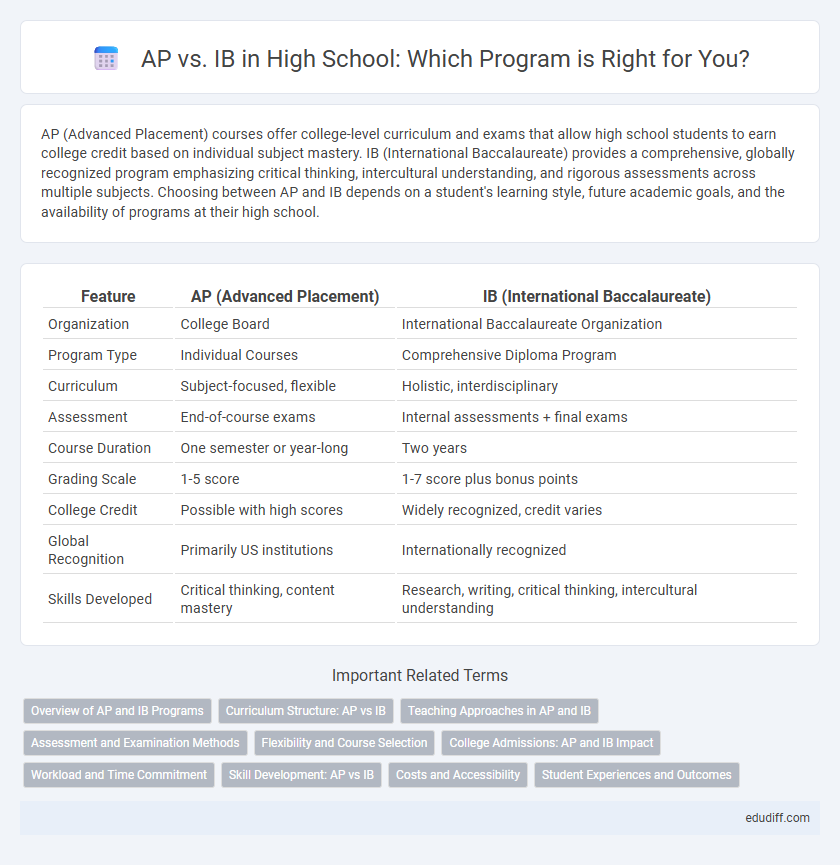AP (Advanced Placement) courses offer college-level curriculum and exams that allow high school students to earn college credit based on individual subject mastery. IB (International Baccalaureate) provides a comprehensive, globally recognized program emphasizing critical thinking, intercultural understanding, and rigorous assessments across multiple subjects. Choosing between AP and IB depends on a student's learning style, future academic goals, and the availability of programs at their high school.
Table of Comparison
| Feature | AP (Advanced Placement) | IB (International Baccalaureate) |
|---|---|---|
| Organization | College Board | International Baccalaureate Organization |
| Program Type | Individual Courses | Comprehensive Diploma Program |
| Curriculum | Subject-focused, flexible | Holistic, interdisciplinary |
| Assessment | End-of-course exams | Internal assessments + final exams |
| Course Duration | One semester or year-long | Two years |
| Grading Scale | 1-5 score | 1-7 score plus bonus points |
| College Credit | Possible with high scores | Widely recognized, credit varies |
| Global Recognition | Primarily US institutions | Internationally recognized |
| Skills Developed | Critical thinking, content mastery | Research, writing, critical thinking, intercultural understanding |
Overview of AP and IB Programs
The Advanced Placement (AP) program offers college-level courses and exams in specific subjects, allowing high school students to earn college credit based on exam performance. The International Baccalaureate (IB) Diploma Program provides a comprehensive, two-year curriculum emphasizing critical thinking, international-mindedness, and a core of extended essays and community service. Both programs aim to prepare students for higher education but differ in structure, assessment methods, and global recognition.
Curriculum Structure: AP vs IB
The AP (Advanced Placement) curriculum offers a flexible, subject-by-subject approach, allowing students to choose individual courses tailored to their strengths and interests. The IB (International Baccalaureate) program features a comprehensive, integrated curriculum requiring students to take courses across six subject areas, including language, social studies, sciences, mathematics, arts, and a core involving Theory of Knowledge, Extended Essay, and CAS activities. AP courses emphasize depth in specific subjects, whereas IB emphasizes breadth and interdisciplinary connections within a rigorous, holistic educational framework.
Teaching Approaches in AP and IB
AP courses emphasize subject-specific content mastery through traditional lectures and standardized assessments, focusing on in-depth knowledge and test performance. IB programs integrate interdisciplinary teaching with inquiry-based learning, encouraging critical thinking, global perspectives, and continuous internal assessments. This contrast highlights AP's structured curriculum versus IB's holistic and student-centered approach.
Assessment and Examination Methods
AP courses primarily emphasize multiple-choice exams and free-response questions graded by the College Board, offering a one-time standardized test assessment. IB assessments include both internal evaluations like oral presentations and extended essays, combined with external exams that test critical thinking and analytical skills over two years. The IB's multi-faceted approach contrasts with AP's focus on end-of-course exams, providing a broader measure of student understanding.
Flexibility and Course Selection
AP offers greater flexibility and a wider range of course options, allowing students to tailor their studies to individual interests and college goals. IB is a comprehensive, standardized program requiring students to take courses across six subject groups, fostering a balanced and interdisciplinary education. Students seeking specialized courses often prefer AP, while those interested in a holistic curriculum may choose IB.
College Admissions: AP and IB Impact
AP courses demonstrate mastery in specific subjects through standardized exams, often leading to college credit and advanced placement, which enhances college admissions profiles. IB programs emphasize holistic education with rigorous assessments and the Extended Essay, showcasing critical thinking and global awareness valued by selective universities. Both AP and IB positively impact college admissions by highlighting academic rigor, but IB's comprehensive curriculum can offer a broader demonstration of skills beyond subject expertise.
Workload and Time Commitment
AP courses generally require less overall workload and time commitment compared to IB courses, which include extensive internal assessments, extended essays, and a mandatory Theory of Knowledge course. IB's rigorous curriculum demands consistent study habits and significant project management skills due to its six-subject structure and core components like CAS (Creativity, Activity, Service). Students in IB programs often face an intense schedule that extends beyond traditional classroom hours, whereas AP courses allow more flexibility in balancing extracurricular activities.
Skill Development: AP vs IB
AP courses emphasize mastery of specific subjects through rigorous content and exam-focused preparation, fostering analytical and critical thinking skills tailored to college readiness. IB programs cultivate a broader skill set by integrating inquiry-based learning, interdisciplinary connections, and global perspectives that enhance research, communication, and time management abilities. Students in IB develop well-rounded competencies adaptable across diverse academic disciplines, while AP students gain depth in individual subjects with a strong emphasis on standardized testing performance.
Costs and Accessibility
AP courses generally offer a more affordable option for high school students, with exam fees typically around $94 per test, making them accessible to a broader range of schools and families. IB programs often incur higher costs due to mandatory school authorization fees, teacher training, and annual program fees, which can limit availability primarily to well-funded schools. Accessibility varies significantly as AP courses are widely available across public and private schools, while IB programs are less common and tend to be concentrated in urban or affluent districts.
Student Experiences and Outcomes
AP courses offer flexibility with subject choices and are widely recognized by U.S. colleges, providing students the opportunity to earn college credit based on exam performance. IB emphasizes critical thinking and global perspectives through a structured curriculum, including the extended essay and CAS requirements, often fostering strong time-management and research skills. Students in IB programs report higher engagement and preparation for university-level work, while AP students benefit from targeted subject mastery and potential cost savings on college tuition.
AP vs IB Infographic

 edudiff.com
edudiff.com